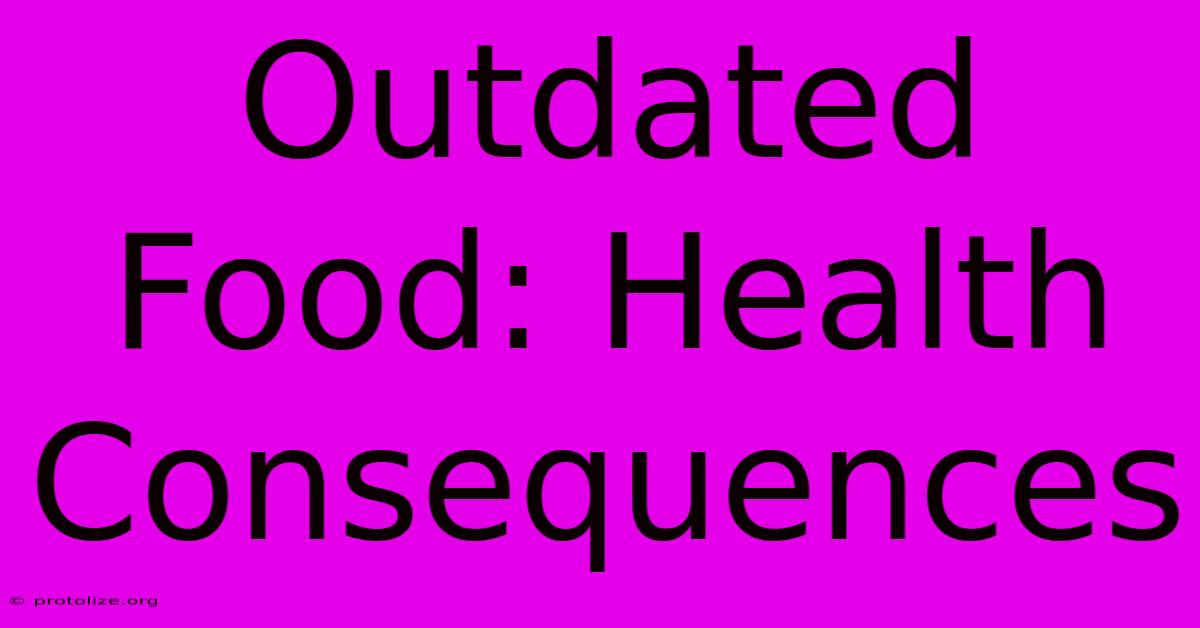Outdated Food: Health Consequences

Discover more detailed and exciting information on our website. Click the link below to start your adventure: Visit Best Website mr.cleine.com. Don't miss out!
Table of Contents
Outdated Food: Health Consequences
Consuming outdated food can have serious consequences for your health. While the "use-by" and "best-before" dates are primarily indicators of quality and not necessarily safety, eating food past its prime significantly increases your risk of foodborne illness. This article will explore the potential health risks associated with consuming outdated food and offer tips on how to prevent food spoilage.
Understanding Food Spoilage and Expiration Dates
It's crucial to differentiate between "best before" and "use by" dates. "Best before" dates refer to the peak quality of the product. While the food might not be at its best after this date, it's usually still safe to consume if properly stored. However, "use by" dates signify a potential safety concern. After this date, the risk of bacterial growth and foodborne illness increases significantly.
Types of Food Spoilage:
Food spoilage happens through various mechanisms, including:
- Bacterial Growth: Bacteria are the most common cause of food spoilage and foodborne illnesses. They thrive in specific temperature and moisture conditions, rapidly multiplying and producing toxins.
- Fungal Growth: Molds and yeasts can also contaminate food, leading to spoilage and potential health problems. Visible mold growth is a clear indication that the food should be discarded.
- Enzyme Activity: Natural enzymes within food can break it down over time, altering its texture, flavor, and nutritional value.
Health Risks of Eating Outdated Food
Eating expired food puts you at risk of various illnesses, including:
Food Poisoning:
This is perhaps the most common consequence of consuming outdated food. Symptoms can range from mild discomfort (nausea, vomiting, diarrhea) to severe illness requiring hospitalization. The severity depends on the type of bacteria, the amount of toxin produced, and the individual's immune system.
Bacterial Infections:
Specific bacteria like Salmonella, E. coli, Listeria, and Campylobacter can cause serious infections, potentially leading to long-term health issues like kidney failure or reactive arthritis. These infections are particularly dangerous for pregnant women, young children, and the elderly.
Toxin Buildup:
Some bacteria produce toxins that are heat-resistant, meaning even cooking the food might not eliminate the risk. These toxins can cause severe gastrointestinal distress and other health complications.
Allergic Reactions:
Spoiled food can sometimes trigger allergic reactions, especially if mold growth is present. These reactions can range from mild to life-threatening.
How to Prevent Food Spoilage and Minimize Risks
Several strategies can help reduce the risk of consuming outdated food:
- Proper Storage: Store food according to package instructions. Refrigerate perishable items promptly and freeze food intended for longer storage.
- FIFO Method (First In, First Out): Organize your refrigerator and pantry so that older items are used before newer ones.
- Check Expiration Dates Regularly: Make it a habit to check expiration dates before purchasing and using food.
- Inspect Food Visually: Look for signs of spoilage, such as mold growth, discoloration, unusual odors, or slimy textures.
- Cook Food Thoroughly: Ensure food is cooked to the recommended internal temperature to kill harmful bacteria.
- Practice Good Hygiene: Wash hands thoroughly before and after handling food. Clean and sanitize kitchen surfaces regularly.
When to Throw Away Food
Err on the side of caution. If you're unsure about the safety of a food item, it's always better to discard it. Don't hesitate to throw away food that exhibits any signs of spoilage, regardless of the expiration date. Your health is worth more than the cost of the food.
In conclusion, while some foods might still be safe to eat past their "best before" date, consuming outdated food, particularly past its "use by" date, significantly increases the risk of foodborne illnesses and other health complications. Following proper food storage and handling practices is crucial to minimizing these risks and ensuring food safety. Remember, prevention is always better than cure.

Thank you for visiting our website wich cover about Outdated Food: Health Consequences. We hope the information provided has been useful to you. Feel free to contact us if you have any questions or need further assistance. See you next time and dont miss to bookmark.
Featured Posts
-
Crm In Retail
Dec 09, 2024
-
Jaguars Vs Titans Odds Picks And How To Watch
Dec 09, 2024
-
Raiders Vs Buccaneers Live Tv Schedule
Dec 09, 2024
-
Crm Windows
Dec 09, 2024
-
Vardys Late Goal Leicester Draw Brighton
Dec 09, 2024
